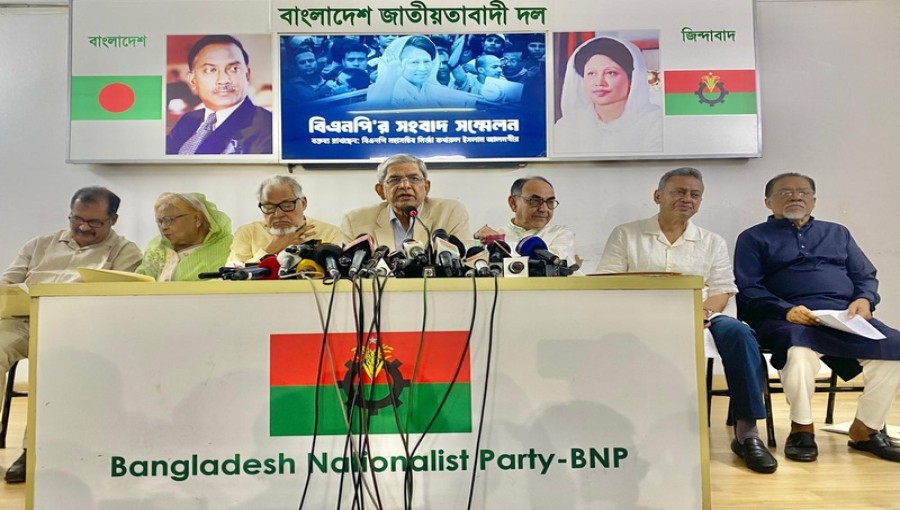
Photo: BNP Media Cell
BNP Secretary General Mirza Fakhrul Islam Alamgir addresses a press conference at the BNP Chairperson’s office in Gulshan, demanding the government disclose all MoUs signed with India and criticizing the agreements as threats to Bangladesh’s sovereignty and national security.
At a press conference held at the BNP Chairperson’s office in Gulshan, Party Secretary General Mirza Fakhrul Islam Alamgir demanded the immediate public disclosure of all agreements, expressing grave concerns over the implications for national sovereignty and security.
Dhaka, June 30 (V7N)- The Bangladesh Nationalist Party (BNP) has criticized the 10 Memorandums of Understanding (MoUs) signed with India during Prime Minister Sheikh Hasina’s recent visit to New Delhi, labeling them a "new version of slavery." BNP demanded the government immediately disclose all agreements signed with the neighboring country.
During a press conference at the BNP Chairperson’s office in Gulshan, Party Secretary General Mirza Fakhrul Islam Alamgir expressed concerns over the agreements, particularly the plan to grant India a rail corridor through Bangladesh. He argued this would be detrimental to national interests and security.
"The head of the illegal mafia government, Sheikh Hasina, who has deprived people of their voting rights, has signed 10 MoUs with India. This is a new version of slavery,” Fakhrul stated. He vowed that BNP would mobilize public opinion against these "anti-state" deals.
Fakhrul warned that providing India with a rail corridor to connect different parts of India through Bangladesh would jeopardize the nation's sovereignty. He accused Sheikh Hasina of conspiring to entrap Bangladesh in a prolonged dependency on India, compromising the country’s independence and security.
He also alleged that Sheikh Hasina, who lacks a public mandate, signed these MoUs to extend the Awami League’s grip on power, rather than for the benefit of the nation. “We demand that all agreements signed with India, including the recent ones, be made public immediately,” Fakhrul insisted.
According to Fakhrul, the deals signed on June 22, 2024, pose a significant threat to Bangladesh’s national security. He claimed that these agreements integrate Bangladesh's defense and security with India’s, endangering the country’s independence.
Fakhrul suggested that through these MoUs, Sheikh Hasina aims to position Bangladesh as a strategic buffer state for India in regional geopolitics. He predicted this would entangle Bangladesh in regional geopolitical conflicts.
On June 21, Prime Minister Sheikh Hasina embarked on a two-day state visit to India at the invitation of Indian Prime Minister Narendra Modi. The following day, Dhaka and New Delhi signed 10 MoUs to strengthen bilateral relations.
Indian media reported that the rail tracks would connect the Indian Railways to the northeast with the rest of the country via Bangladesh, bypassing the 22 km Siliguri Corridor, known as the ‘Chicken's Neck.’
Fakhrul argued that Bangladesh gains nothing from these 10 MoUs, which were signed out of Sheikh Hasina's responsibility to India rather than national interest. He highlighted the absence of progress on the Teesta River water-sharing agreement, which has been pending since 2011.
He opposed India’s involvement in the Teesta water conservation project, asserting it would conflict with Bangladesh's interests. Fakhrul criticized the government’s silent stance on the killings of Bangladeshis by the Indian Border Security Force (BSF), citing data from Ain O Salish Kendra showing at least 1,236 Bangladeshis killed between 2000 and 2020.
Fakhrul emphasized that while BNP supports good relations and connectivity with friendly countries, national interest and sovereignty must be prioritized. “The current illegitimate government of Sheikh Hasina has put national security and sovereignty under threat to maintain illegitimate power,” he said.
BNP Standing Committee members Mirza Abbas, Amir Khosru Mahmud Chowdhury, Nazrul Islam Khan, and Selima Rahman were present at the press conference.
END/V7N/SMA/DK/

Comment: